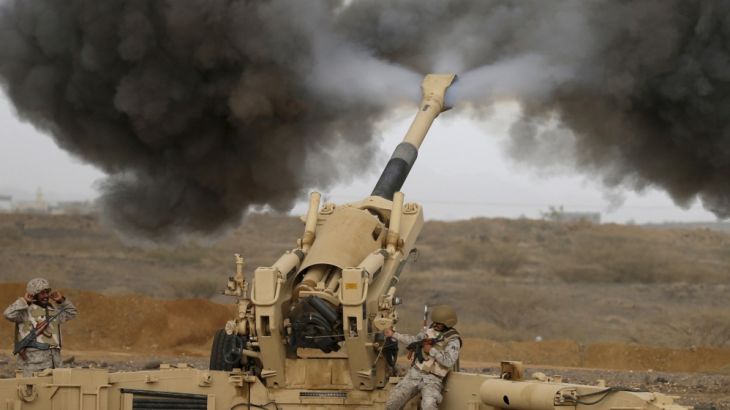UN Security Council set to vote on Yemen resolution
Russia’s position key in Tuesday’s vote on draft text calling for Houthi rebels to end violence and withdraw from Sanaa.

The UN Security Council will vote on a resolution to blacklist the son of Yemen’s former president and a Houthi leader, and effectively impose an arms embargo on the rebels who rule most of the country, diplomats have said.
The draft resolution, obtained early on Tuesday by the AP news agency, demands that the Houthis “immediately and unconditionally” end all violence and withdraw their forces from the capital Sanaa and other areas they have seized since September 2014.
Keep reading
list of 4 itemsUN’s Libya envoy resigns citing no hope for political progress
UN urges restraint as Iran and Israel trade barbs at Security Council
Iran claims ‘right to self-defence’ in Israel attack
It demands that the rebel group give up all arms and missiles seized from military and security facilities, stop acting like a government, and release the defence minister and all political prisoners.
The resolution would also impose a global asset freeze and travel ban on Ahmed Saleh, the former head of Yemen’s elite Republican Guard, and on Abdulmalik al-Houthi, a top leader of the Shia Houthi group.
|
|
Saleh’s father, former President Ali Abdullah Saleh, and two other senior Houthi leaders, Abd al-Khaliq al-Huthi and Abdullah Yahya al Hakim, were blacklisted by the Security Council in November.
Yemeni soldiers loyal to the former president are fighting alongside the Houthis.
Russia’s vote key
It was unclear how Russia would vote on the resolution, drafted by council member Jordan and Gulf Arab states. The vote is set to take place later on Tuesday.
Russia had unsuccessfully suggested during negotiations that the text call for an immediate ceasefire and that an arms embargo include President Abd-Rabbu Mansour Hadi’s government, diplomats said.
The Russian UN mission declined to comment on whether it would support the resolution, abstain or veto, according to the Reuters news agency.
News of the vote came as aid agencies and the UN warned of a growing humanitarian crisis in Yemen.
“Over 600 people [have been] killed [in the conflict], but more than half of them are civilians. This is particularly concerning,” Ivan Simonovic, UN’s deputy secretary-general for human rights, told Al Jazeera on Monday.
“So far we can say with confidence that both sides have not exercised sufficient restraint. There were some unselective targeting and we are very concerned about that.”
Nine Arab countries led by Saudi Arabia launched air strikes on Shia rebels on March 26 after the rebels stormed the presidential palace in Sanaa and put President Hadi under house arrest, demanding political reforms.
The rebels, known as Houthis, swept into Sanaa in September and have since tried to expand their control across the country.
Saudi Arabia said on Monday that 120 air strikes had targeted Houthi positions in the previous 24 hours.
US support
The coalition is supported by the United States, which has supplied arms and has also carried out drone attacks against al-Qaeda fighters in Yemen.
Humanitarian groups have struggled to bring aid into the country and said on Monday that the situation in Aden was deteriorating rapidly.
Afzal Ashraf, a consultant fellow at the London-based Royal United Services Institute, told Al Jazeera that the Saudi-led coalition faced a dilemma over getting their military on the ground as air strikes alone would not achieve the coalition’s aims.
“This is the problem that the Saudi-led coalition is facing. They want to avoid ground forces, but they can’t make any meaningful change on the ground using air strikes alone,” said Ashraf.
UN special envoy for Yemen Jamal Benomar has been urging the parties to come to a negotiated settlement. Saleh has also called for a UN-sponsored dialogue.